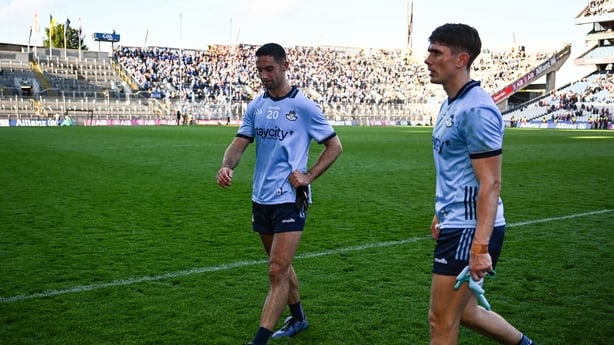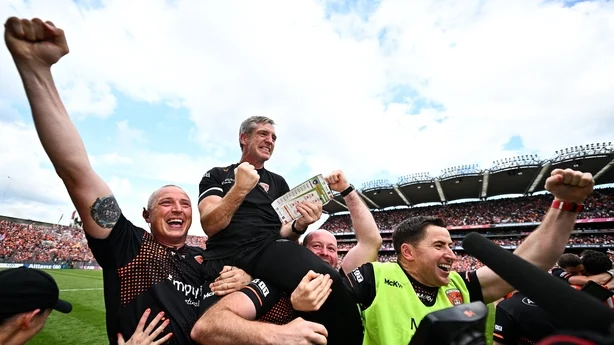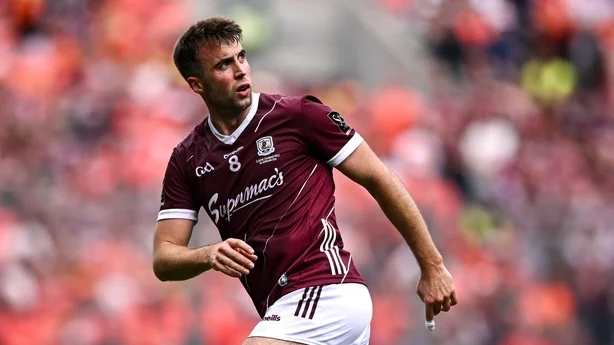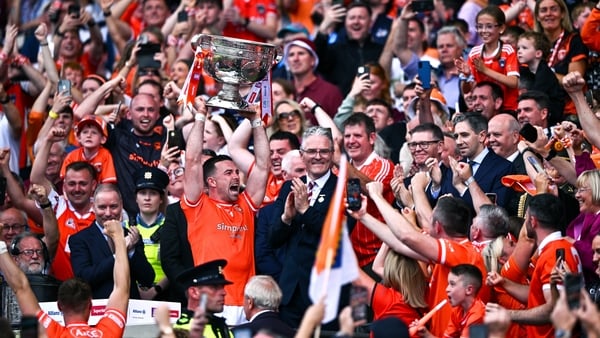As we reach the mid-2020s, the inter-county football scene suddenly resembles the early 2000s.
Ulster teams hogging all the silverware, while the Dubs are increasingly worried about whether they'll be able to keep it kicked out in the Leinster championship next year.
It's all a far cry from the turn of the decade when we were still in the midst of the most oppressive era of dominance that inter-county Gaelic football had ever known, with no hint of the end in sight.
Back in the eerily surreal days of the Covid championship, the air was thick with recrimination. Every crushing Dublin victory played out in an accusatory atmosphere, the cue for another round of apocalyptic whingeing.
The growing consensus then was that the county system, never the most equitable of arrangements at any time, was now totally kaput, broken beyond repair.
The oft-aired stat was that the average age of the Dublin team came down steadily over the course of the Jim Gavin era, the surest indicator that was not a once-off golden generation but a new permanent reality.
Wary of the surrounding narrative, Dublin fans, always renowned for giving it the big one back in the Pillar Caffrey era, had of late begun adopting a jarringly wistful tone, sighing "ah, sure we know it won't last forever, just have to enjoy these blessed halcyon days while we can, ring-a-ring-a-rosey, as the liiiight decliiiiines..."
It was not uncommon to hear some Dublin supporters quietly utter the heretical thought that it might not be a bad idea for them to ship a beating soon. Five-in-a-row was historic. Six-in-a-row was meh.
Well, the light is declining now. The rural alarmists may be belatedly realising that the Dublin 2010s team was a golden generation after all. The issue on that score was possibly clouded by the 2011 All-Ireland victory, a title which was won against the head by a much more workmanlike side. It was when that team was supplemented by the graduates from the 2011 minor team - the fabled '93s' - that Dublin's era of total domination truly descended.

After a two-year hiatus, Dublin returned to win the 2023 All-Ireland title - the Clucko-McCarthy-Fitzsimons trio collecting a record ninth medal - with a team boasting an older average age than the Kerry 1986 team, hitherto regarded as the most aged team ever to get over the line on All-Ireland final day.
It was thought that might be the cue for a wave of retirements but they decided to press ahead for another year. This summer's quarter-final loss - the first time Dublin had failed to reach the last-four since 2009 - has been taken as the end of an era.
James McCarthy's last act in a Dublin jersey was flailing at an over-hit pass, and getting dispossessed by Damien Comer, thundering in from his blindside to tee up Galway's final score of the game in injury-time.
If McCarthy's exit had been anticipated, then Brian Fenton's abrupt retirement was a severe jolt. It was assumed that others might follow though that still remains to be seen.
In the days after the Fenton departure, Paul Flynn announced that the Leinster football championship, a grotesque parody of a sporting contest for the past decade, may even be up for grabs in 2025.
Incoming Meath manager Robbie Brennan, formerly of Kilmacud, cautioned that there are still scores of capable footballers scattered around Dublin but their imperial phase has, for now, passed into history.
"Your strongest steel is forged in fire"
Full disclosure, when I gave notice of my intention to write about the new democratic landscape in inter-county football as of the end of 2024, my colleague Niall McCoy, author of 'Kings for a Day: The Story of Armagh and their 2002 Journey to Sam Maguire', replied, more or less instantaneously, with "There's your landscape" above a link to the video of the PSNI landrovers screeching and yahooing up the main thoroughfare in Camlough, a scene which attracted the ire of various unionist talking heads in the aftermath.
An early sign, perhaps, that some Armagh fans are slightly getting the hump with the 'if they can win it, what excuse have we?' narrative that is currently running rampant among residents of Division 1.
Armagh's burst from the peloton to win the 2024 title was a stunning late season twist on a par with Tyrone's post-Covid outbreak smash-and-grab triumph three years earlier.
As late as June, Armagh were still pegged as doomed nearly men, under the sway of a hopelessly unlucky general. According to Kieran McGeeney's army of critics at the time, the Armagh boss's highly-strung aura was an inhibiting factor for his players and not unconnected to their alleged tendency to clam up in sight of the finish line.
Geezer's failure to win silverware in his tumultuous five-year spell in Kildare was sometimes entered into the record here, ignoring the context that no manager not called Mick O'Dwyer had won championship silverware with Kildare in the past half-century.

The devastation after the Ulster final was heightened by the sense this was their plausible means of winning silverware. However, for the second year running, Armagh recovered in the round-robin phase.
Their swaggering demolition of Derry was taken as more a reflection of the sudden crisis of confidence within Mickey Harte's squad.
Frustrated by a passive first half against Galway, McGeeney had opted to spend more of the county board's money by making referee Sean Hurson bang on the dressing room door multiple times before they emerged for the second half in Markievicz Park. In a foreteller of what was to come, they dug out the required result against Galway, manufacturing a draw at the death to secure top spot and a weekend off before the sprint for the All-Ireland.
The unremarkable win over Roscommon was overshadowed by Galway ending the Dubs' year the same afternoon but it was an important psychological hump to get past, their first All-Ireland semi-final appearance since 2005.
They seemed liberated after that and grasped the opportunity of a lifetime in the following month, to win their second ever All-Ireland title.
In the nerve-shredding finales to both semi-final and final, the manager reckoned previous disappointments had hardened them, observing, "sometimes, your strongest steel is forged in fire."
As for the critics, including within the county, McGeeney heard only sweet silence - "It's like I'm wearing a pair of ear muffs."
2025 - most open championship in decades?
There's a sense that the age of empires is over in inter-county football and there's a thrilling power vacuum at the top.
Then there's the added layer of uncertainty generated by the new enhanced rules, which were premiered to a wider audience in October's re-born Railway Cup - won again, by Ulster - but will only be properly tested in a grimly competitive environment come the Allianz League late next month.
The changes were unveiled in a blaze of publicity which sceptics regarded as excessive, with the two-point arc and the requirement to leave three attackers upfield among the most consequential changes. The four-point goal - which would have left poor Jackie Fullerton entirely flummoxed altogether - was deemed a bridge too far at the present time and wasn't put to a vote.
Central Council delegates, whether dazzled by the star power of the committee before them or wearied from sitting through so many "intriguing" chess matches, voted through the new rules with the kind of majorities that Vladimir Putin might envy.

Potentially more seismic for the association going forward is the possibility of the Revenue Commission peering underneath the tables which Peter Quinn could never find 20+ years ago.
With change afoot on several fronts, who are best placed in 2025? The Dubs looking fallible again, most are turning their eyes to the north for contenders.
Teams who break a long famine to win an All-Ireland title tend not to go back-to-back too often. The giddy post-All-Ireland glow tends to rob them of some measure of manic desire. Armagh came close enough in 2003, losing an ugly final to provincial rivals Tyrone.
Nonetheless, they've shed so much baggage this year and should be infused with a new lightness and confidence. We heard certain off-hand remarks that they take too kindly to the rulebook being re-written in the immediate aftermath of them winning, but these changes were a while in the pipeline.
They could even play into their hands, in certain areas. Rian O'Neill, who has that Ernie Els quality of appearing to gently stroke the ball only to send it a mile, should make serious hay with the two-point arc.
Donegal are a hot tip among many observers, reasoning that Jim McGuinness delivered an All-Ireland in Year Two of his first stint.
They are clearly on maneuvers over the winter, scooting off to Abu Dhabi for a training camp as soon as the inter-county training ban was lifted. Two years after his retirement, Michael Murphy returns as a likely target man/ enhanced rules expert consultant.
Tyrone have a name for anaemic title defences dating back to the glorious noughties, but the current generation have stepped things to another level. Brian Dooher and Feargal Logan's three years in charge following their opportunistic All-Ireland win in 2021 put one in mind of Davy Fitz's Clare team.
They've turned to an outside manager for the first time in 2025, albeit the least contentious one going. Malachy O'Rourke should have plenty of material with which to work, the peerless Canavan brothers recently inspiring Errigal Ciaran to the county's first Ulster club victory since 2002.
Galway may still be recuperating from a particularly galling All-Ireland final defeat, the most sickening they've experienced since 1983.
In 2022, they were clear underdogs with most of the pre-match pressure loaded on Kerry. They might have won that day but it would have been ahead of schedule. In 2024, their moment seemed to have arrived, facing off against a team new to that stage. The dramatic collapse in their shooting efficiency in the final will haunt them a while yet.

On paper, they remain arguably as good as what's around, especially if they get their leading forwards off the treatment table. Paul Conroy, who finished with both his first All-Star at 35 and the Footballer of the Year award, could see his usual points tally doubled thanks to the new rules.
They look in better shape than their Connacht old firm rivals, Mayo, all the same. Amid a troubling winter off the field, they have lost seven players for 2025, with Cillian O'Connor and Padraig O'Hora the most high profile opt-outs.
Kerry endured a curiously blank, colourless season in 2024. Installed as favourites by default when Dublin took their leave of the summer, almost all their games were non-events, including the much hyped but ultimately tedious quarter-final victory over Derry.
David Clifford cut a fairly forlorn figure for much of the 2024 championship. Against league champions Derry in the quarters, the chess game had evolved to a point where the two-time Footballer of the Year was deployed as an extremely high powered decoy. The purists and the reformers had nightmare visions of Clifford spending his career hemmed in by a phalanx of markers, like Gerry Hutch leaving the RDS.
Jack O'Connor, who is sticking around for Year 4, was strangely philosophical in the wake of the semi-final defeat, placing a surprisingly degree of emphasis on the impact of the Armagh crowd, which, as usual, generated an incredible wave of sound in extra-time.
While O'Connor remains in situ, there's change in the background, with Cian O'Neill, part of the 2014 All-Ireland winning management team, returning to the Kerry fold from Galway.
Their northern defensive guru Paddy Tally, perceived as influential in their 2022 success, departs to take the hot-seat in Derry, after a managerial search nearly as protracted as the FAI one which introduced us to Heimir Hallgrimsson.
The league champions' bizarre implosion in the championship was one of the great curiosities of the summer. Shell-shocked by the four-goal blitz from Donegal, they never quite recovered their bearings and Mickey Harte's controversial move to Derry will be recalled as a brief interlude.
With the off-season to plot and plan, the 2024 Division 1 winners have the tools to contend next season. Them, and several others.




